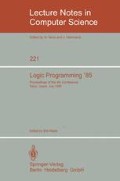Abstract
We have developed a travel consultation system which extracts user's requests through natural language (Japanese) conversation and answers destinations that fit the case.
The system has four parts, the parsing subsystem, the user model subsystem, the sentence generator, and the database retriever. All subsystems are written in PROLOG.
The distinctive characters of conversations which our system makes are:
-
smoothness and kindness,
-
that the system can be a topic introducer, and
-
efficiency.
How the system works is as follows:
First, the system parses Japanese sentences that the user inputs. The input sentences are interpreted as user's requests, not as the answer for the previous question. So he can add any requests other than the questioned one. Next, the system guesses the user's type, evaluating user models that the system has. Each user model represents the expected type of users. Then it generates a next question which that type of users would care. This parse-guess-generate sequence are continued till the topics which the user cares are exhausted. At last the system searches the database and shows places that satisfy all requests of the user.
Preview
Unable to display preview. Download preview PDF.
References
Barwise J, Perry J (1983) Situations and Attitudes. MIT Press, Cambridge, Mass.
Bobrow DG, Kaplan RM, Kay M, Norman DA, Thompson H, Winograd T (1977) GUS, A Frame-Driven Dialog System. Artificial Intelligence 8: 155–173
Carbonell JR (1970) AI in CAI: An Artificial Intelligence Approach to Computer-Assisted Instruction. IEEE transaction on Man-Machine Systems MMS-11: 190–202
Coulthard M (1977) An Introduction to Discourse Analysis. Logman, London Grice HP (1975) Logic and Conversation. In: Morgan JL (ed) Syntax and Semantics III: Speech Acts. Academic Press, New York, p 41
Inoue K (1976) Henkei Bunpou to Nihongo ('Transformational Grammar and Japanese'). Taishukan, Tokyo (in Japanese)
Kaplan RM, Bresnan J (1982) Lexical-Functional Grammar. In: Bresnan J (ed) Mental Representation of Grammatical Relations. MIT Press, Cambridge, Mass., p 173
Mizutani S, Ishiwata T, Ogino T, Kaku N, Kusanagi Y (1983) Bunpou to Imi I ('Grammar and Semantics I'). Asakura, Tokyo (in Japanese)
Neustupný JV (1982) Gaikokujin-tono Communication ('Communication with Foreigners'). Iwanami, Tokyo (in Japanese)
Shibatani M (1978) Nihongo-no Bunseki ('Analysis of Japanese'). Taishukan, Tokyo (in Japanese)
Suzuki H (1984) Nihongobun-no Imi-no Joukyouimirontekina Kijutsu ('Event Types Represent Meanings of Japanese Sentences'). Information Processing Society of Japan, WGNL 42-3 (in Japanese)
Suzuki H, Kiyono M, Kougo S (1985) User-no Kaiwa-no Kata-wo Mochii-ta Shitsumon Outou System ('selecting Topics in a Dialog according to Users Type'). Information Processing Society of Japan, WGNL 49-3 (in Japanese)
Takahashi M, Suzuki H, Kiyono M (1985) Production System wo Mochii-ta Nihongo Bunseisei ('Generation of Japanese Sentences by Production'), Proceedings of the 30th semiannual meeting of Information Processing Society of Japan: 1675–1676 (in Japanese)
Teramura H (1982) Nihongo-no Syntax to Imi I ('syntax and Semantics of Japanese I'). Kuroshio, Tokyo (in Japanese)
Yasukawa H (1984) LFG System in Prolog. Proceedings of the 10th International Conference on Computational Linguistics: 358–361
Author information
Authors and Affiliations
Editor information
Rights and permissions
Copyright information
© 1986 Springer-Verlag Berlin Heidelberg
About this paper
Cite this paper
Suzuki, H., Kiyono, M., Kougo, S., Takahashi, M., Motoike, S., Niki, T. (1986). A travel consultation system: Towards a smooth conversation in Japanese. In: Wada, E. (eds) Logic Programming '85. LP 1985. Lecture Notes in Computer Science, vol 221. Springer, Berlin, Heidelberg. https://doi.org/10.1007/3-540-16479-0_22
Download citation
DOI: https://doi.org/10.1007/3-540-16479-0_22
Published:
Publisher Name: Springer, Berlin, Heidelberg
Print ISBN: 978-3-540-16479-1
Online ISBN: 978-3-540-39820-2
eBook Packages: Springer Book Archive

